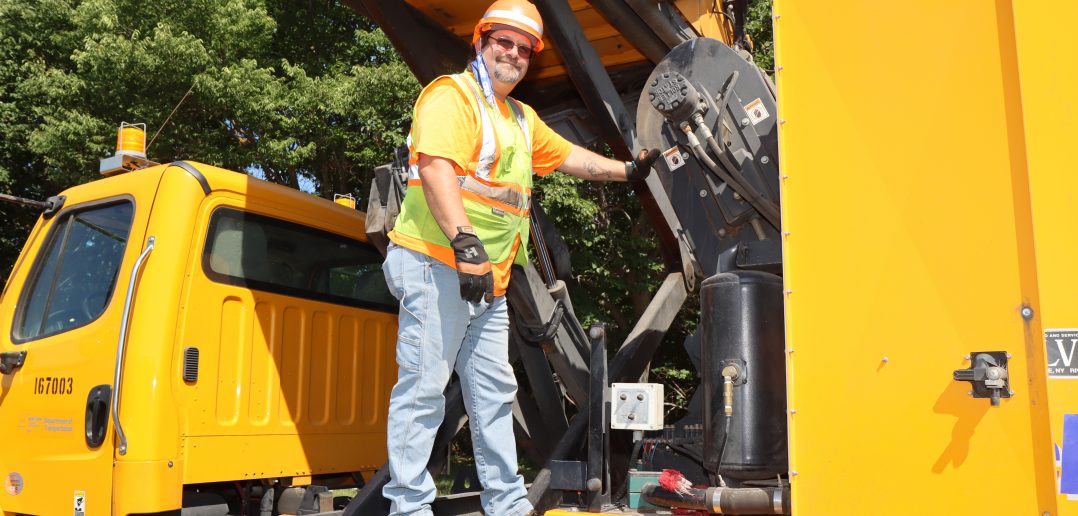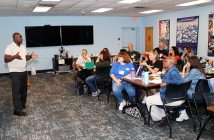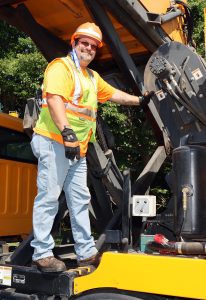
Highway Maintenance Worker 1 Joseph O’Donnell checks a sweeper for a jam.
Editor’s Note: When the COVID-19 pandemic hit New York earlier this year, highway workers employed by the state Department of Transportation and local governments were gearing up for their annual busy, warm-weather road maintenance season.
As the pandemic paused much of the state, highway workers had to quickly adjust to new protocols to continue to maintain roadways. Through it all, strong workplace safety and health measures helped keep the workers safe.
Many highway workers have also been playing a key role in responding to the crisis, including transporting supplies, building signs and traffic patterns for outdoor testing sites and taking measures at worksites to allow public employees to provide services more safely.
Here is a look at how DOT and local government highway workers in the hard-hit Long Island and Southern regions are facing what is becoming the new normal.
Extra measures help DOT workers be safe
MEDFORD — State Department of Transportation (DOT) workers are used to facing extreme weather conditions to ensure the roadways are safe for New Yorkers, but now, they are also front-line workers during the COVID-19 pandemic.
Extra measures
At DOT’s Medford yard on Long Island, CSEA members are working to ensure a safe work environment.
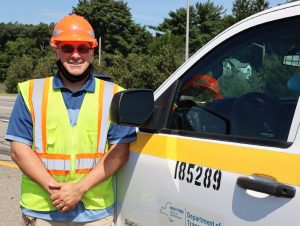
Department of Transportation (Babylon) Local
Recording Secretary Randy Acum.
“The pandemic has completely changed the climate of our work,” said State Department of Transportation (Babylon) Local Recording Secretary Randy Acum. “Everyone is far more attentive in making sure their workspace is clean and disinfected.”
Whenever possible, only one worker is assigned to a vehicle, and there is never more than two people in a vehicle at a time. Even then, the vehicle occupants do not sit side-by-side; one person will be in the back, seated on the opposite side of the driver. Vehicles are also disinfected before employees enter and after they exit. The workers are also careful to use sanitizer often because they often share tools.
“We wear rubber gloves under our work gloves as added layer of protection,” said Acum. “Everyone was given their own sanitizer.”
Certain tasks are assigned based on minimizing exposure, including assigning staff to the same vehicles. Shifts were also split.
“We were divided into teams to try to mitigate the possibility of spreading the virus to the entire yard if someone were to get sick,” said Acum. “Originally, there were three teams that would report to work every third day. Now that COVID-19 numbers in our area are down, there are two teams that report to work an hour apart.”
Helping with response
Many DOT workers across the state played key roles in pandemic response, including transporting supplies between test sites and helping manage traffic at drive-thru sites.
At the Medford yard, members volunteered to transport COVID-19 samples from local hospitals and nursing homes to a laboratory in Albany where the samples were analyzed to learn more about the virus.
In late May, medical supplies needed to extract COVID-19 samples started being delivered to the DOT Medford yard for members to deliver to surrounding elder care facilities.
“We were tasked with assembling each testing kit, in addition to delivering them,” said Acum. “We have union brothers and sisters working at surrounding hospitals. We did what was necessary to get them what they needed.”
DOT workers also provided all of the fuel for the COVID-19 test sites at Stony Brook University Hospital and Jones Beach. For several months, members refueled the testing site twice a day. As the number of COVID-19 patients decreased, so did the necessary visits.
Routine work continues
Even during the pandemic, members have continued their normal work responsibilities, including mowing, fixing potholes and repairing signs.
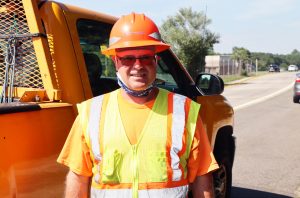
Department of Transportation (Babylon) Local
member and Highway Maintenance Supervisor
Robert Castrovinci.
“This time of year, there are a lot of guardrail repairs,” said Robert Castrovinci, a DOT highway maintenance supervisor based in Medford. “There are a lot of accidents because people are on the road more and they’re not paying attention. The cause of an accident could be using the cell phone, eating in the car or just looking away for a second.”
“From the time you leave your home to the time you get to where you’re going, you have to take a road,” said Acum. “We maintain the infrastructure so the traveling public can keep moving while doing it safely.”
— Wendi Bowie

